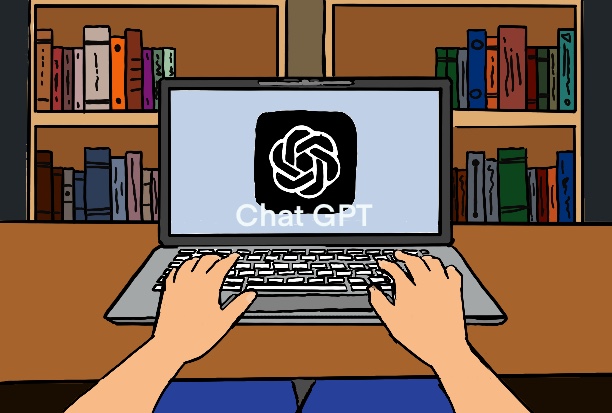According to The Almanac, “doing someone else’s work or claiming ownership of someone else’s work, whether published or unpublished, or generated by AI or an outside entity” violates the school’s academic integrity policy.
However, with the proliferation of free AI resources, students have a way to generate work for assignments with unprecedented ease. Dr. Thomas Fisher, instructor in history, philosophy & religion, said, “The biggest change is how easy it is now to submit work that is not your own for the purpose of tricking your teacher into thinking that you did work that you didn’t do. ChatGPT is like having a friend who will write an essay for you at any time immediately, and it’ll be a pretty good one.”
OpenAI’s ChatGPT is a form of generative AI that can respond to prompts at length and with nuance. After ChatGPT’s release in November, 2022, the school’s academic office reevaluated the academic integrity policy to specify that submitting AI-generated work, except where explicitly specified, was a violation of academic integrity. In Feburary 2023, Mr. Richard Davis, dean of academic life, clarified the school’s policy with language that restricted AI use in classrooms without explicit permission by the instructor. If permission is granted, usage of AI has to be clearly indicated and cited.
Detecting AI-generated content remains a significant challenge for the school and the wider world. While similarity-detection tools like Turnitin are relatively proficient at detecting copying from sources like books, articles, or even other students, engines purporting to detect use of ChatGPT or Google’s AI Chatbot, Bard, are comparatively new and unreliable. For instance, GPTZero, a website that supposedly identifies AI use, writes in a disclaimer, “This result should not be used to directly punish students.”
While detection software still lags behind, generative AI software are making their writing much more human-like. A new plugin for ChatGPT, Humanizer Pro, produces work that is nearly impossible to differentiate from human-generated writing. While this plugin isn’t created by OpenAI, it it hosted by the company and accessible directly through ChatGPT. With a few clicks, this tool is able to tweak ChatGPT’s responses so that flaggable characteristics are no longer present. This arms race of sorts is tilting further towards ChatGPT and other AI softwares and away from detection.
Some faculty are modifying lesson plans to discourage unwanted AI use by students. Ms. Sara Forbes, instructor in Spanish, reports that the department is giving more in-class assessments to counteract the risks of translation and generative AI software.
Many teachers are finding ways to integrate generative AI into their classrooms. For example, Dr. Fisher’s Global Thinking classes last year, students used ChatGPT to gather sources for use in an annotated bibliography. This year, their students can choose from a variety of resources for this assignment, including consulting with librarians or asking ChatGPT. The students’ final evaluation will require that they explain and justify the use of AI, or other resources.
Alex Gish ’26 said, “While the ease of access and temptation of AI should be taken into account when giving us students the keys to the car, it’s important to look on the flip side and utilize it for good as well.”







